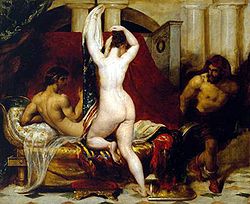- Voyeurism
-
"Voyeur" redirects here. For other uses, see Voyeur (disambiguation).
In clinical psychology, voyeurism is the sexual interest in or practice of spying on people engaged in intimate behaviors, such as undressing, sexual activity, or other activity usually considered to be of a private nature.[1]
Voyeurism (from the French voyeur, "one who looks") can take several forms, but its principal characteristic is that the voyeur does not normally relate directly with the subject of their interest, who is often unaware of being observed. The practice of making a permanent image of an intimate activity has been made easier with modern photographic and video technology, and is considered an invasion of privacy. However, in today's society the concept of voyeurism has evolved, especially in popular culture. Non-pornographic reality television programs such as Survivor and The Real World, are prime examples of voyeurism, where viewers (the voyeur) are granted an intimate interaction with a subject group or individual. Although not necessarily "voyeurism" in its original definition, as individuals in these given situations are aware of their audience, the concept behind "reality TV" is to allow unscripted social interaction with limited outside interference or influence. As such, the term still maintains its sexual connotations.
Male voyeurs are commonly labeled "Peeping Toms", which originates from the Lady Godiva legend.
Contents
DSM IV Classification
Voyeurism Classification and external resources ICD-10 F65.3 ICD-9 302.82 Certain voyeuristic fantasies, urges and behavior patterns are classified as a paraphilia in the Diagnostic and Statistical Manual of the American Psychiatric Association and a disorder of sexual preference in the ICD-10.[2][3] The diagnosis would not be given to people who experience typical sexual arousal simply by seeing nudity or sexual activity.
Legal position
Voyeurism is not a crime in common law. In common law countries it is only a crime if made so by legislation. In Canada, for example, voyeurism was not a crime when the case Frey v. Fedoruk et al. arose in 1947. In that case, in 1950, the Supreme Court of Canada held that courts could not criminalize voyeurism by classifying it as a breach of the peace and that Parliament would have to specifically outlaw it. On November 1, 2005, this was done when section 162 was added to the Canadian Criminal Code, declaring voyeurism to be a sexual offense.[4]
In some cultures, voyeurism is considered to be a sex crime[citation needed]. In the United Kingdom, non-consensual voyeurism became a criminal offense on May 1, 2004.[5] Little to no research has been done into the demographics of voyeurs.
In the English case of R v Turner (2006),[6] the manager of a sports center filmed four women taking showers. There was no indication that the footage had been shown to anyone else or distributed in any way. The defendant pleaded guilty. The Court of Appeal confirmed a sentence of nine months' imprisonment to reflect the seriousness of the abuse of trust and the traumatic effect on the victims.
Another English case in 2009, R v Wilkins (2010),[7][8] resulted in a man who filmed his intercourse with five of his lovers for his own private viewing, being sentenced to imprisonment for eight months and ordered to sign the Sex Offenders Register, where his name would remain for ten years.
In the United States, video voyeurism is an offense in nine states and may require the convicted criminal to register as a sex offender.[9] The original case that led to the criminalization of voyeurism has been made into a television movie called Video Voyeur and documents the criminalization of secret photography. Criminal voyeurism statutes are related to invasion of privacy laws[10] but are specific to unlawful surreptitious surveillance without consent and unlawful recordings including the broadcast, dissemination, publication, or selling of recordings involving places and times when a person has a reasonable expectation of privacy and a reasonable supposition they are not being photographed or filmed by "any mechanical, digital or electronic viewing device, camera or any other instrument capable of recording, storing or transmitting visual images that can be utilized to observe a person."[11]
In the Louise Ogborn strip search incident, the perpetrator was said to be engaged in a form of virtual voyeurism.[12]
Technique
A voyeur may observe others without them being aware of it by a number of strategies. The voyeur may observe the subject from a distance, or use stealth to observe the subject with the use of peep-holes, two-way mirrors, hidden cameras, secret photography and other devices and strategies. Secret photography may involve the use of normal cameras, but with the photographer being concealed. Sometimes the camera itself is disguised or concealed. The use of telephoto lens enables the distance from the subject to provide concealment.
Although spy cameras small enough to fit inside a pocket-watch had existed since the 1880s,[13] advances in miniaturization and electronics since the 1950s have greatly aided the ability to conceal miniature cameras, and the quality and affordability of tiny cameras (often called "spy cameras" or subminiature cameras) has now greatly increased. Some consumer digital cameras are now so small that in previous decades they would have qualified as "spy cameras", and digital cameras of eight megapixels or more are now being embedded in some mobile camera phones.
Certain image capturing devices are capable of producing images through materials that are opaque to visible light, including clothing. These devices form images by using electromagnetic radiation outside the visible range. Infrared and terahertz-wave cameras are capable of creating images through clothing, though these images differ from what would be created with visible light.[14][15]
Combatting voyeurism
Some institutions, such as gyms and schools, have banned camera phones because of the privacy issues they raise in areas like changerooms (locker rooms).
Saudi Arabia banned the sale of camera phones nationwide in April 2004, but reversed the ban in December 2004. Some countries, eg. South Korea and Japan, require all camera phones sold in their country to make a clearly audible sound whenever a picture is being taken.
Secret photography by law enforcement authorities is called surveillance and is not considered to be voyeurism, though it may be unlawful or regulated in some countries.
Historical aspects
Candaules, King of Lydia, Shews his Wife by Stealth to Gyges, One of his Ministers, As She Goes to Bed by William Etty. This image illustrates Herodotus's version of the tale of Gyges.
Voyeurism is not a new phenomenon, and, according to one study, instances of it can be found in the Bible.[16]
Criminology
The USA FBI assert that some individuals who engage in "nuisance" offenses (such as voyeurism) may also have a propensity for violence based on behaviors of serious sex offenders.[17] An FBI researcher has suggested that voyeurs are likely to demonstrate some characteristics that are common, but not universal, among serious sexual offenders who invest considerable time and effort in the capturing of a victim (or image of a victim); careful, methodical planning devoted to the selection and preparation of equipment; and often meticulous attention to detail.[18]
In popular culture
Some fine art photographers have displayed a fascination with the forms of secret voyeuristic photography.[specify]
Voyeuristic photography has also been centrally explored in movies such as Michael Powell's Peeping Tom, and Michelangelo Antonioni's Blowup, and has appeared to comic effect in films such as Gregory's Girl and American Pie.
In the popular cult film, The Rocky Horror Picture Show, "In another dimension with voyeuristic intention. Well secluded, I see all" is sung in the film's theme "Time Warp." It explains how the film's "handymen" are able to see their guests if they ever decide to get intimate with each other .
Voyeurism is a common plot device in both serious (e.g. Rear Window, Klute and more recently Disturbia) and humorous (e.g. Porky's, Animal House and more recently Semi-Pro, American Pie) films.
The anime Colorful is devoted almost entirely to voyeurism. Also, in the anime Baka to Test to Shōkanjū, Kōta Tsuchiya is subject to voyeurism, explaining why he is referred to as "Voyeur".
The 2002 television movie Video Voyeur: The Susan Wilson Story is based on a true story about a woman who was secretly videotaped. The movie subsequently helped to get the law against voyeurism passed in parts of the United States. In Visual Pleasure and Narrative Cinema, Laura Mulvey talks about scopophilia – deriving pleasure from looking – in terms of feminist film theory. On That '70s Show, Fez is known to always want to watch his friends make out, among other things.
See also
- Clothed female, naked male
- Clothed male, naked female
- Courtship disorder
- Exhibitionism
- Invasion of privacy
- Scopophobia, the fear of being stared at
Notes
- ^ Hirschfeld, M. (1938). Sexual anomalies and perversions: Physical and psychological development, diagnosis and treatment (new and revised edition). London: Encyclopaedic Press.
- ^ "ICD-10". http://www.who.int/classifications/apps/icd/icd10online/gf60.htm. Retrieved 2008-09-13.
- ^ BehaveNet Clinical Capsule: Voyeurism
- ^ Criminal Code
- ^ Section 67 of the Sexual Offences Act 2003; brought into force by the Sexual Offences Act 2003 (Commencement) Order 2004
- ^ (2006) All ER (D) 95 (Jan)
- ^ (2010) Inner London Crown Court, R v Wilkins.
- ^ BBC Radio producer jailed over sex tapeshttp://news.bbc.co.uk/2/hi/uk_news/england/london/8549608.stm
- ^ Peeping Tom Law & Legal Definition[not in citation given]
- ^ Invasion of Privacy Law & Legal Definition
- ^ Stephanie's Law
- ^ Strip search prank call scam.
- ^ Secret watch camera, c.1886
- ^ cnn, 16 April 2008: New security camera can 'see' through clothes
- ^ ThruVision T5000 T-Ray Camera sees through Clothes
- ^ Aggrawal, Anil. (April 2009). "References to the paraphilias and sexual crimes in the Bible". J Forensic Leg Med 16 (3): 109–14. doi:10.1016/j.jflm.2008.07.006. PMID 19239958. http://www.sciencedirect.com/science?_ob=ArticleURL&_udi=B8CY1-4TRHCD9-1&_user=5081486&_rdoc=1&_fmt=&_orig=search&_sort=d&_docanchor=&view=c&_acct=C000047720&_version=1&_urlVersion=0&_userid=5081486&md5=ccfb8545a50236e6819a0666ba569db2.
- ^ R.R. Hazelwood and J. Warren, "The Serial Rapist: His Characteristics and Victims," FBI Law Enforcement Bulletin, February 1989, 18-25
- ^ The Criminal Sexual Sadist[dead link]
External links
- UK law on voyeurism
- Proposed US Video Voyeurism Prevention Act of 2003
- Video Voyeurism Laws
- Expert: Technology fosters voyeurism
Mental and behavioral disorders (F 290–319) Neurological/symptomatic OtherPsychoactive substances, substance abuse, drug abuse and substance-related disorders Schizophrenia, schizotypal and delusional Psychosis Schizophrenia Mood (affective) Neurotic, stress-related and somatoform - Agoraphobia
- Social anxiety
- Social phobia
- (Anthropophobia)
- Specific phobia
- (Claustrophobia)
- Specific social phobia
OtherPhysiological/physical behavioral Nonorganic
sleep disordersPostnatal- Postpartum depression
- Postnatal psychosis
Adult personality and behavior - Sexual maturation disorder
- Ego-dystonic sexual orientation
- Sexual relationship disorder
- Paraphilia
- (Voyeurism
- Fetishism)
Other- Personality disorder
- Impulse control disorder
- (Kleptomania
- Trichotillomania
- Pyromania
- Dermatillomania)
- Body-focused repetitive behavior
- Factitious disorder
- (Münchausen syndrome)
Mental disorders diagnosed in childhood - X-Linked mental retardation
- (Lujan-Fryns syndrome)
Psychological development
(developmental disorder)- ADHD
- Conduct disorder
- (ODD)
- emotional disorder
- (Separation anxiety disorder)
- social functioning
- (Selective mutism
- RAD
- DAD)
- Tic disorder
- (Tourette syndrome)
- Speech
- (Stuttering
- Cluttering)
- Movement disorder
- (Stereotypic)
Symptoms and uncategorized Paraphilias Abasiophilia · Acrotomophilia · Agalmatophilia · Algolagnia · Andromimetophilia/Gynemimetophilia · Apotemnophilia · Autassassinophilia · Autoandrophilia/Autogynephilia · Biastophilia · Chremastistophilia · Chronophilia · Coprophilia · Dacryphilia · Dendrophilia · Dippoldism · Emetophilia · Erotic asphyxiation · Erotophonophilia · Exhibitionism · Formicophilia · Frotteurism · Gerontophilia · Hebephilia · Homeovestism · Hybristophilia · Infantophilia · Katoptronophilia · Kleptophilia · Klismaphilia · Lactaphilia · Macrophilia · Narratophilia · Nasophilia · Necrophilia · Object sexuality · Odaxelagnia · Olfactophilia · Omorashi · Paraphilic infantilism · Partialism · Pecattiphilia · Pedophilia · Pictophilia · Pygophilia · Pyrophilia · Sadomasochism · Salirophilia · Sexual fetishism · Somnophilia · Sthenolagnia · Symphorophilia · Tamakeri · Telephone scatologia · Transvestic fetishism · Transvestophilia · Trichophilia · Troilism · Urolagnia · Vorarephilia · Voyeurism · Zoophilia · ZoosadismSee also Categories:- French loanwords
- Visual perception
Wikimedia Foundation. 2010.


